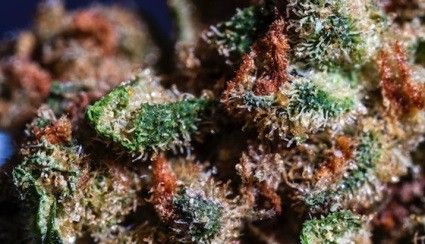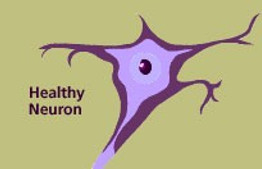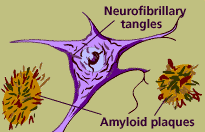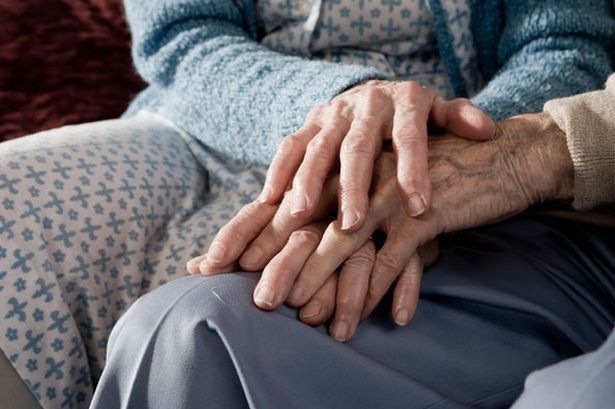Dementia was once considered an inevitable consequence of ageing. However, we now know that it is a physically based disease resulting from a loss of brain cells. Brain function, or certain aspects of brain function, decline to the point that mental disability results. Forgetfulness, fearfulness, depression, agitation, difficulty absorbing new information, loss of normal emotional responses, and an ability to remember things that happened years ago, but not things that took place a few minutes ago, are typical. Other signs include mood swings, jealousy, paranoia, frustration, anger, insensitivity to the feelings of others, fear of being alone, repeating conversations, inability to make decisions or complete a task, lack of a sense of time, hoarding, failure to recognise people, and self-neglect. The disorder usually gets progressively worse and is considered incurable. Complications that may occur include injuries primarily due to falls, inadequate nutrition, constipation and a variety of infections.

In Australia, nearly 1 in 10 people over the age of 65 have been diagnosed with dementia. Dementia is the single greatest cause of disability in Australian’s over the age of 65 years, and the third leading cause of disability burden overall. It is predicted that there will be more than 590,000 people diagnosed within the next decade, and over a million by 2058.
Compelling Study confirms the Positive Therapeutic effects of CBD in the fight against Dementia
The evidence is in: Medical cannabis successfully treats Dementia
A recent (2018) animal study has indicated that CBD helps restore memory loss due to aging and dementia. This is what many medical CBD users and experts already knew, but it does help create some medical CBD scientific credibility with mainstream medicine.
The 2018 Study Revealed mice with symptoms similar to Dementia were put through physical testing that demonstrated their memory capacity before and after low dose DBD administration. The mice were grouped according to ages of two, twelve and eighteen months. (The average rodent lifespan is around 24 months, thus the 12 and 18-month mice represented the older aged spectrum of mammalian life, while the mice aged two months represented mammalian youth). Mice that were not given CBD were considered the control group.
The older mice that were administered CBD performed much better with the various physical forms of memory testing after CBD than they were before treatment. They even performed as well as healthy young mice. However, the older mice in the control group that were not given CBD lost memory.
A key hallmark of Dementia disease is the build-up of clumps of a protein called amyloid, in the brain. Studies have shown that CBD appears to remove this protein from nerve cells grown in the lab. Another study that gave both THC and CBD oil to mice with symptoms of Dementia showed an improved learning, and had less evidence of amyloid lumps in their bodies.
Research continues to better understand the effects of CBD oil on the brain. Some early evidence suggests that CBD oil may reduce inflammation in the brain, but this has yet to be proven in humans. The study’s abstract explains that there is scientific evidence confirming the benefits of CBD in reducing Dementia symptomsThere are five ways CBD can work to improve health outcomes for people with Dementia.

1. By reducing inflammation – Reducing inflammation has been shown to increase the negative impact of Dementia. The inflammatory response happens when the brain’s immune cells fail to clear disorienting blockages. The inflammation that is a core cause of Dementia symptoms can be reduced by administering CBD oil.

2. By reducing oxygen buildup – Oxygen is released as a reactive, stress-induced component of Dementia. When inflammation occurs in the brain, oxygen is released as a result. The greater the inflammation, the greater the negative impact. Important brain functions such a memory are decreased as more oxygen is released in the brain’s cells. Memory loss and other brain deterioration indirectly leads to increased oxygen in the brain. CBD is an antioxidant which helps reduce the problems associated with oxygen stress. Brain functions impacted by oxygen stress can be improved with the use of CBD.

3. By working as a brain stimulant and neuro-protectant – Dementia patients’ brain cells often show a path of rapid decline and destruction. The potential of stimulating brain tissue was recently discovered as a potential benefit of CBD. In clinical trials, CBD has shown the ability to reverse and even prevent the development of Dementia’s negative impact. (A 2011 study by Australian researchers Tim Karl and Carl Group found that CBD promotes the growth and development of brain cells, which were shown to reduce the decline of memory and other brain functions).

4. By slowing buildup of neural plaques – A pathological indication of Dementia is the buildup of amyloid plaques within the neural tissue. Initial tests indicate administering CBD slows the growth of these aggressive, toxic peptides. A 2008 study published in Molecular Pharmaceutics found that CBD slowed this amyloid β-peptide (Aβ) overgrowth.

5. Stalling other Dementia Symptoms – One of the most compelling arguments for CBD is its ability to alleviate other symptoms associated with Dementia. In a 2014 study that appeared in Journal of Alzheimer’s Disease, authors reported a low dose of CBD to be “a considerably more effective inhibitor of AChE-induced Aβ deposition than the approved drugs for Alzheimer’s disease treatment, donepezil and tacrine, which reduced Aβ aggression by only 22% and 7% respectively, at twice the concentration used in their studies.
The topic of CBD health benefits continues to grow with new CBD and Dementia research.
 Jenny was in her late 50s when she began to suffer from symptoms that concerned her. She was worried by sudden mood swings, having trouble remembering words at work and when it came time to introduce people to each other in her managerial role, she found that their names just disappeared, causing her a great deal of embarrassment.
Jenny was in her late 50s when she began to suffer from symptoms that concerned her. She was worried by sudden mood swings, having trouble remembering words at work and when it came time to introduce people to each other in her managerial role, she found that their names just disappeared, causing her a great deal of embarrassment.

Within a normal healthy brain there are cells which pass messages from one area to another. When grandparents speak about the good old days it is thanks to these cells connecting their memory hub with their centres of speech. These messages pass through a small space between each cell. In dementia patients this space becomes clogged by an abnormal structure and communication comes to a halt. Furthermore, the long thin part of the cell that the message passes across is destroyed from within due to a change in an important protein. This causes the cell to shrivel and die, leaving behind what scientists call a neurofibulary tangle. The tangle in conjunction with the plaques that prevent cellular communication are the two features which define Dementia.
Not just getting old, her memories were being erased by a disease that was causing her brain to physically wither away and die. Dementia! (Alzheimer’s)!

There is currently no cure for dementia but there is one promising frontier, cannabis. Chemicals in cannabis including CBD are now at the frontier of dementia research because they have potential to reduce and prevent the formation of dementia plaques. If plaque formation can be slowed or halted as recent studies suggest, and if patients can be diagnosed early enough then the potential exists to prevent debilitating and lethal forms of dementia. CBD has been found effective in improving symptoms in mouse models of dementia.
From a user’s perspective, CBD may reduce stress and anxiety in the individual with dementia as well as reduce the decline of memory and other brain functions.

A recent Australian study concluded that the mouse model findings could easily be followed up in clinical trials since CBD is well tolerated by humans. Despite the promising research however, the news is not all good. In July 2015 a series of media articles reported that cannabis had been proven ineffective in treating dementia. The only problem with the headlines is that they were not true. The study they were referring to was commissioned to determine the safety of THC pills for persons with dementia, as well as other technical data. The conclusion reached was that the pills were safe and that further human studies with higher doses were warranted. Thankfully, not everyone was fooled by the headlines.
Natural health is becoming more and more mainstream… but so is powerful opposition to it.
People are fed up with the increasingly widespread censorship of content that does not align with powerful financial interests and political agenda, which do not serve the common good. Corrupt Science, Media Collusion and billions of dollars invested in the pharmaceutical industry world-wide each year, inhibit and contradict what initially formed the basis of modern medicine over 2 centuries ago; herbal remedies, including cannabis.
What do we do?
ASK QUESTIONS & KEEP ASKING QUESTIONS UNTIL YOU ARE SATISFIED WITH THE ANSWERS,WAKE UP. DO YOUR OWN HOMEWORK WITHOUT RELYING ON YOUR DEPENDENCE ON THE SYSTEM, MAINTAIN YOUR INDEPENDENCE. YOUR WERE BORN WITH A BRAIN, USE IT.
Cognitive ageing
Cognitive ageing is the decline in cognitive processing that occurs as people get older. Age-related impairments in reasoning, memory and processing speed can arise during adulthood and progress into their elder years.
Normal cells can only divide a finite number of times before they break down to apoptosis (programmed cell death).

100 years ago, Australia’s birth rate was higher, but fewer people survived to old age. With improved sanitation, infectious diseases and childbirth mortality rates became less serious threats. As the tide of infectious diseases receded, the rocks that were always there became exposed. As the tide recedes even further, the new rocks to be revealed are the neuro-degenerative diseases that strike the brain most often in old age. Systemic degenerative diseases such as Dementia will be the overwhelming priority of health care throughout the 21st century.
What is Cannabidiol (CBD)?
CBD is a concentrated extract from the hemp plant. The oil is extracted from the flowers, leaf and stalk of the plant. It is important not to confuse CBD oil with hemp seed oil, which is extracted from the plant’s seed and doesn’t have any of the medicinal benefits that CBD oil has.
Is CBD Oil Legal in Australia?
CBD oil is legal in Australia, but under special access. Products containing CBD are considered a ‘scheduled product”. The Australian Government legalised the use of CBD oil for medical purposes in 2016. Currently, it is not yet available “over the counter” and must be prescribed by an authorised physician.
How is CBD Oil different to Marijuana?
CBD oil is very different to taking cannabis recreationally. CBD has medical properties. With medical products, they’re standardised – they only use a certain part of the hemp plant, extracting oil to get a compound that is reproducible and regulated. CBD oil will be the same every time you buy it, unlike “recreational cannabis” when there is no real consistency with the product – where it comes from; where it was grown; which part of the plant was used, etc.
Benefits of CBD Oil tackling the symptoms of Dementia
Clinical Research and trials are ongoing. CBD oil works on the body’s endocannabinoid system. Receptors are throughout our bodies – in the brain, gut, muscles. These receptors react to cannabinoids in an anticonvulsant fashion, reducing anxiety, stress and tension. Research does suggest that CBD oil is beneficial for managing some of the symptoms of dementia.
An upcoming clinical trial (spring 2019), based at Kings College London will look at whether a Cannabis-based medicine could be used to reduce symptoms of agitation and aggression in a small group of people with Dementia.

The study team will recruit volunteers with dementia between 55 and 90 years of age who are living in care homes and have symptoms of agitation or aggression. The trial volunteers will take the medication for four weeks and researchers will compare the results from those taking standard medications, and those taking a placebo. While a major focus for dementia research is to develop drugs that slow or stop the progression of the physical diseases that cause dementia, what really matters is that a medicine benefits people’s day-to-day lives. This trial opens a door to a treatment that may help to alleviate an extremely challenging set of symptoms. WATCH THIS SPACE.
The brain and central nervous system go through the aging process just like any other part of the human body. Neurodegeneration is the progressive loss of structural and functional neurons. Many neurological diseases are a direct result of this process. Once you reach the age of 65 and over, you are more likely to suffer from one or more neurological problems. 36% of seniors 85 years and older have moderate to severe memory impairment, making neurological health a priority among our senior community. The most common neurological disorders that afflict seniors include:
- Dementia
- Alzheimer’s disease
- Parkinson’s disease
- Stroke
- Peripheral neuropathy and polyneuropathy
- Myasthenia Gravis
Seniors in assisted living communities are more likely to use psychotropic drugs than middle-aged adults to manage neurological disorders. These pharmaceuticals are known to have serious side effects that seniors are more vulnerable to. When managing psychotropic drug use with other medications seniors by me take for physical disorders, dedicated doctor guidance is vital. Since seniors are so much more vulnerable to these serious side effects, finding alternative treatments and ways to prevent neurological health disorders is pertinent. Preclinical research has showcased CBD as a promising solution for neurological disorder prevents and for treating certain onset conditions.
At iCannabis we are focused on bringing the purest and most bioavailable medical cannabis to Australian patients and their families.
We are a group that specializes in educating and helping Australia patients gain access to Cannabis for Medical purposes. Through education and real-life experiences with the healing powers of this plant.
Once you discover the documented benefits tens of thousands of patients around the world have received from the medicine, you too will realise how this can potentially change and improve the lives of you and your family. The positive impact this plant has already had on the quality of life for patients and their families is nothing short of miraculous.
At iCannabis we are committed to establishing an Australian medical cannabis community comprised of passionate and caring people, focused on the highest quality organic medicine made with love and integrity.
If you need any advice or help with CBD Dementia care or sourcing full spectrum cannabis oil treatments please contact us. We try to answer all emails within 24 hours and are happy to help and advise on all aspects of CBD treatments in complete confidence.

